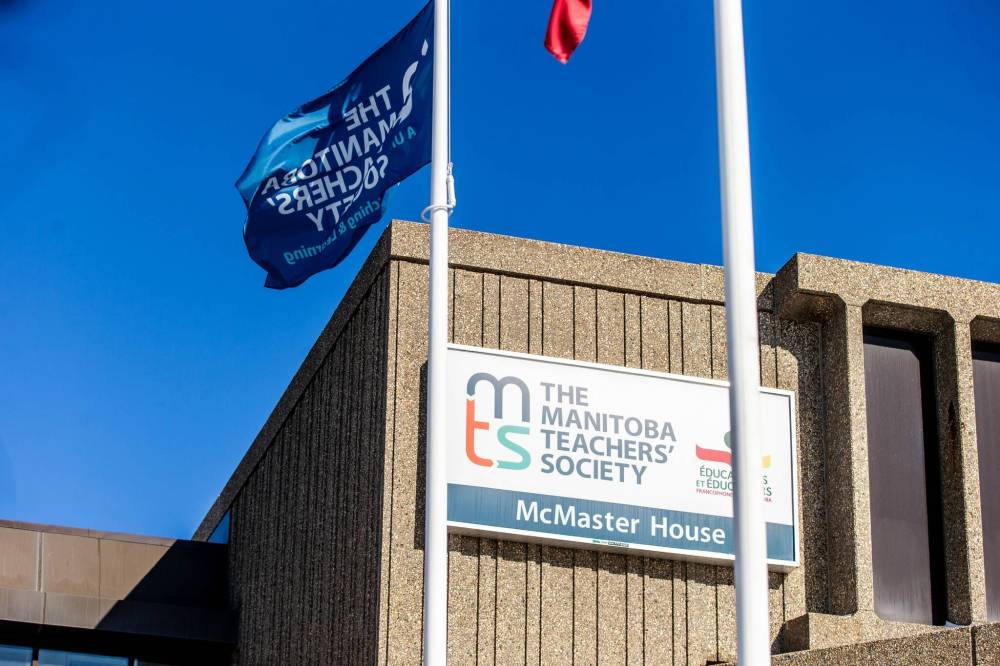NDP should hold fast on teachers’ discipline
Advertisement
Read this article for free:
or
Already have an account? Log in here »
To continue reading, please subscribe:
Monthly Digital Subscription
$1 per week for 24 weeks*
- Enjoy unlimited reading on winnipegfreepress.com
- Read the E-Edition, our digital replica newspaper
- Access News Break, our award-winning app
- Play interactive puzzles
*Billed as $4.00 plus GST every four weeks. After 24 weeks, price increases to the regular rate of $19.00 plus GST every four weeks. Offer available to new and qualified returning subscribers only. Cancel any time.
Monthly Digital Subscription
$4.75/week*
- Enjoy unlimited reading on winnipegfreepress.com
- Read the E-Edition, our digital replica newspaper
- Access News Break, our award-winning app
- Play interactive puzzles
*Billed as $19 plus GST every four weeks. Cancel any time.
To continue reading, please subscribe:
Add Winnipeg Free Press access to your Brandon Sun subscription for only
$1 for the first 4 weeks*
*$1 will be added to your next bill. After your 4 weeks access is complete your rate will increase by $0.00 a X percent off the regular rate.
Read unlimited articles for free today:
or
Already have an account? Log in here »
Hey there, time traveller!
This article was published 24/07/2024 (438 days ago), so information in it may no longer be current.
It appears the union representing teachers in Manitoba will stop at nothing to try to shield its members from accountability when found guilty of misconduct.
The Manitoba Teachers’ Society fought tooth and nail last year when the former Progressive Conservative government brought in sweeping changes to how allegations of teacher wrongdoing are handled.
Now, as the new NDP government prepares to implement that law, MTS is calling on the province to water down several aspects of it.

MIKAELA MACKENZIE / FREE PRESS FILES
The Manitoba Teachers’ Society building in Winnipeg.
Among the union’s proposed revisions: it wants the province to exclude discipline histories of teachers from a new public registry that is slated to be part of the Education Administration Amendment Act. Doing so would undermine the main purpose of the new law, which is to ensure that the public is made aware of teacher misconduct and to hold educators accountable for their actions.
Under existing rules, allegations of teacher misconduct are dealt with by the union itself — a conflict of interest the new law seeks to eliminate — or by the school division or province, depending on the severity of the complaint. In all cases, little to no information is made public.
The new legislation will create an independent commissioner to hear complaints and a panel of three people, including one teacher, to adjudicate cases. Findings of wrongdoing will be publicized on an online registry and will include the teacher’s name and the nature of the misconduct.
It is a fair and balanced approach, similar to what exists for other professions, such as for doctors, nurses and lawyers.
MTS has been opposed to the changes since they were first introduced in the legislative assembly last year. They claimed it would result in an “open season” on teachers, a sensationalized and inaccurate characterization of the new process.
The public, including parents, have a right to know whether a teacher has been found guilty of wrongdoing. It’s not good enough to simply list a teacher’s name on a registry. It must include the nature of the offence to have any meaning.
The union also wants the province to expand the size of the panels that hear cases to five members and guarantee that they are made up of a majority of teachers. It is also calling for a ban on anonymous allegations and a two-year time limit on complaints.
Those proposed changes are designed solely to make it easier for teachers to escape scrutiny. There are no compelling reasons to accept them.
Some aspects of the legislation may need to be fine-tuned through regulations, as the province gets set to proclaim the bill into law. However, the main features of the legislation should remain intact. The bill already received the necessary scrutiny last year when it went through the legislative process, which included extensive public hearings.
The NDP should resist MTS’s attempt to alter the new law. The party voted in favour of the legislation last year while in Opposition. It should continue to support it now that it is in government.
Politically, that could pose a challenge for the Kinew government. Like most unions, MTS is a political ally of the NDP and has historically supported the party during elections. Such political ties risk creating conflicts of interest for NDP governments, especially on matters such as labour laws, or in this case the rules around teacher discipline.
The NDP should rise above that, as it did last year when it supported the bill, to ensure the public interest — particularly the safety and well-being of students — takes precedence over partisan loyalties.


